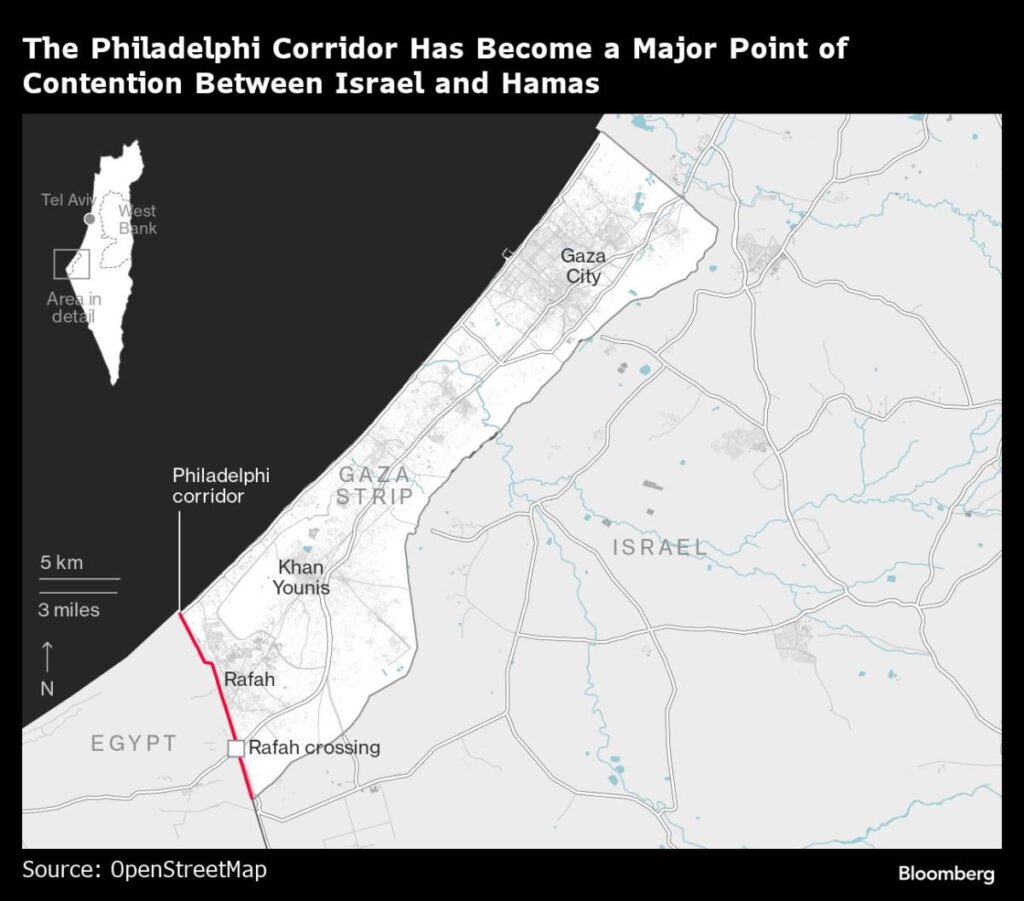(Bloomberg) — The Israeli government has voted to maintain a military presence in the so-called Philadelphia corridor in Gaza, a major stumbling block in ceasefire negotiations with Hamas.
Most read from Bloomberg
Prime Minister Benjamin Netanyahu’s security cabinet has largely approved the policy, according to a report of Thursday’s meeting seen by Bloomberg.
Hamas has been pushing for Israeli troops to leave the area, which runs along the Egypt-Gaza border south of the Palestinian territory, once a ceasefire is reached. The problem is that mediators are annoyed by the fact that they are trying to convince the two sides to pause and finally end the devastating war in Gaza, which has lasted almost 12 months.
In recent weeks, Israel has taken a tougher stance on the Philadelphia corridor, with Netanyahu saying his troops are needed there to prevent Hamas from smuggling weapons from Egypt into Gaza.
According to Israeli ministers, their vote would bring a ceasefire closer by making it clear to Hamas that compromises must be made.
Netanyahu said that the October 7 Hamas attack that sparked the war in Gaza was “possible because the Philadelphia axis was not in Israeli hands,” the readout said. “The prime minister said that this reality will not repeat itself and that this time Israel is determined to keep this border under control.”
Two ministers did not vote in favor. They were Defense Minister Yoav Gallant, who opposed the measure, and Itamar Ben Gvir, the Minister of National Security, who abstained.
Ben Gvir chose not to vote because Netanyahu proposed withdrawing troops and the national security minister does not want any reduction at all, according to an official familiar with the matter.
Gallant opposed the proposal because he argued it would delay a ceasefire — rather than force Hamas to accept one more quickly — and potentially cost the lives of more hostages, an official close to the minister said. The defense minister is at odds with Netanyahu on many aspects of the war and they have often clashed in public. The vote was also presented to the security cabinet without warning, the official said.
The ceasefire negotiations, brokered by the US, Qatar and Egypt, have been dragging on for months and were resumed this week in Doha by junior negotiators.
The corridor is not the only obstacle. Israel and Hamas still have to agree on how many hostages will be released from Gaza in the first phase of a deal, and how many Palestinians will be released from Israeli prisons.
In addition, Netanyahu says Israel will keep troops along a second corridor called Netzarim, which cuts through Gaza, to prevent Hamas fighters from returning to northern parts of the territory. Hamas opposes that demand.
Hamas, designated a terrorist organization by the United States and the European Union, killed 1,200 people and took about 250 hostages when its fighters swept into southern Israel from Gaza on October 7. More than 40,000 Palestinians have been killed in the ensuing Israeli offensive, according to the Hamas-run Gaza Health Ministry.
Most read from Bloomberg Businessweek
©2024 Bloomberg LP







